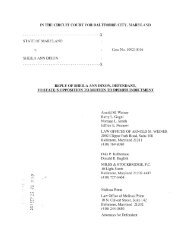Memorandum Opinion - the Circuit Court for Baltimore City
Memorandum Opinion - the Circuit Court for Baltimore City
Memorandum Opinion - the Circuit Court for Baltimore City
You also want an ePaper? Increase the reach of your titles
YUMPU automatically turns print PDFs into web optimized ePapers that Google loves.
tribunal less burdensome”). With <strong>the</strong> advent of <strong>the</strong> internet, technology has progressed inleaps and bounds, but it has still not eliminated <strong>the</strong> due process limitation on a State’sauthority to subject a non-resident to its jurisdiction. See ALS Scan v. Digital ServiceConsultants, 293 F.3d 707, 712-13 (4 th Cir. 2002) (rejecting <strong>the</strong> notion that an internet usersubmits to <strong>the</strong> jurisdiction of a State by merely sending “electronic signals into <strong>the</strong> State. .. .” because if such an interpretation of minimum contacts were adopted, “State jurisdictionover persons would be universal, and notions of limited State sovereignty and personaljurisdiction would be eviscerated.”).Beyond Systems was <strong>the</strong> first time a Maryland appellate court considered <strong>the</strong>application of personal jurisdiction to cases involving <strong>the</strong> internet. There <strong>the</strong> <strong>Court</strong> citedwith approval <strong>the</strong> test set out in Zippo Manufacturing Co. v. Zippo Dot Com Inc., 952 F.Supp. 1119 (W.D.Pa. 1997) <strong>for</strong> determining when publication on a website <strong>for</strong>ms <strong>the</strong> basis<strong>for</strong> personal jurisdiction.[A]t one end . . . are situations where a defendant clearly doesbusiness over <strong>the</strong> Internet. If <strong>the</strong> defendant enters into contractswith residents of a <strong>for</strong>eign jurisdiction that involve <strong>the</strong> knowingand repeated transmission of computer files over <strong>the</strong> Internet,personal jurisdiction is proper. At <strong>the</strong> opposite end aresituations where a defendant has simply posed in<strong>for</strong>mation on anInternet Website which is accessible to users in <strong>for</strong>eignjurisdictions. A passive Website that does little more than makein<strong>for</strong>mation available to those who are interested in it is notgrounds <strong>for</strong> <strong>the</strong> exercise of personal jurisdiction. The middleground is occupied by interactive Websites where a user canexchange in<strong>for</strong>mation with <strong>the</strong> host computer. In <strong>the</strong>se cases, <strong>the</strong>exercise of jurisdiction is determined by examining <strong>the</strong> level ofinteractivity and commercial nature of <strong>the</strong> exchange ofin<strong>for</strong>mation that occurs on <strong>the</strong> Web site.952 F. Supp. at 1124, cited in Beyond Systems, 388 Md. at 23-24. Although Zippo was citedin Beyond Systems, it was not applied. Instead <strong>the</strong> appellate court concluded that <strong>the</strong>re was23
















